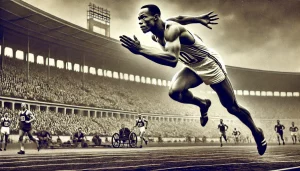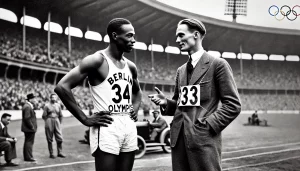Jesse Owens: A Legacy of Triumph and Friendship
 In the summer of 1936, a young African American athlete stood in a packed stadium in Berlin, Germany. The world watched as Jesse Owens prepared to compete, knowing that his performance would challenge the very core of Nazi beliefs.
In the summer of 1936, a young African American athlete stood in a packed stadium in Berlin, Germany. The world watched as Jesse Owens prepared to compete, knowing that his performance would challenge the very core of Nazi beliefs.
Jesse Owens 1936 Olympics triumph is not just a name in the history books; he is a symbol of courage, determination, and triumph against adversity. In this post, we will explore how Owens’ athletic prowess and his actions off the track left an indelible mark on history. How did one man challenge the racial ideologies of Nazi Germany and inspire generations? Let’s find out.
Jesse Owens’ Early Life and Path to the Olympics
Jesse Owens was born on September 12, 1913, in Oakville, Alabama, as the youngest of ten children. Growing up in a time of intense racial segregation, his early life was marked by hardship and poverty. At the age of nine, his family moved to Cleveland, Ohio, in search of better opportunities. It was here that Owens discovered his love and talent for running.
In high school, Owens set records in track and field, showcasing his extraordinary speed and agility. His talents earned him a scholarship to Ohio State University, where he continued to break records and earn national recognition. Owens’ dedication and hard work paved the way for his participation in the 1936 Berlin Olympics, a stage set for both athletic competition and political statements.
Triumph at the 1936 Berlin Olympics and Its Historical Significance
The 1936 Berlin Olympics, held in Nazi Germany, was meant to be a showcase of Aryan superiority. Adolf Hitler and his regime promoted the Games as a demonstration of their belief in the racial supremacy of the “Aryan” race, which they considered to be characterized by fair skin, blond hair, and blue eyes. Hitler believed that the Aryan race was superior to all others, particularly targeting Jews, black people, and other ethnic minorities as inferior.
However, Jesse Owens, an African American athlete, would shatter these illusions on a global stage. Owens’ performance in Berlin  was nothing short of extraordinary. He won four gold medals: in the 100 meters, 200 meters, long jump, and 4×100 meter relay. His victories were a direct contradiction to the racist ideologies espoused by the Nazis. In front of Hitler and the world, Owens’ achievements proved that talent and determination know no racial boundaries. His success not only embarrassed the Nazi regime but also became a powerful symbol in the fight against racism and discrimination.
was nothing short of extraordinary. He won four gold medals: in the 100 meters, 200 meters, long jump, and 4×100 meter relay. His victories were a direct contradiction to the racist ideologies espoused by the Nazis. In front of Hitler and the world, Owens’ achievements proved that talent and determination know no racial boundaries. His success not only embarrassed the Nazi regime but also became a powerful symbol in the fight against racism and discrimination.
Did You Know:
Despite his victories, Owens faced racism at home and abroad. For instance, he was not invited to the White House to be congratulated by President Franklin D. Roosevelt.
Friendship with Lutz Long
 One of the most heartwarming and enduring stories from the 1936 Olympics is the friendship between Jesse Owens and German long jumper Lutz Long. In a display of true sportsmanship, Long gave Owens advice that helped him qualify for the long jump finals. Owens went on to win the gold medal, with Long taking the silver.
One of the most heartwarming and enduring stories from the 1936 Olympics is the friendship between Jesse Owens and German long jumper Lutz Long. In a display of true sportsmanship, Long gave Owens advice that helped him qualify for the long jump finals. Owens went on to win the gold medal, with Long taking the silver.
Their friendship transcended the competition. Owens and Long spent time together in the Olympic Village, forming a bond that would last beyond the Games. They continued to correspond through letters during World War II, until Long’s death in 1943. This unlikely friendship between an African American athlete and a German during a time of such political tension highlighted the power of sports to bring people together, regardless of race or nationality.
Jesse Owens’ story is one of perseverance and the breaking of racial barriers. His legacy goes beyond his athletic achievements, symbolizing the fight for equality and human dignity. As historian David Wallechinsky once said, “Owens’ victories were a blow to Hitler’s Nazi ideology.”
Find Out More!:
- “Jesse Owens: An American Life” by William J. Baker
- The official website of the Jesse Owens Foundation
- The documentary “Jesse Owens” from PBS’s American Experience series


0 Comments